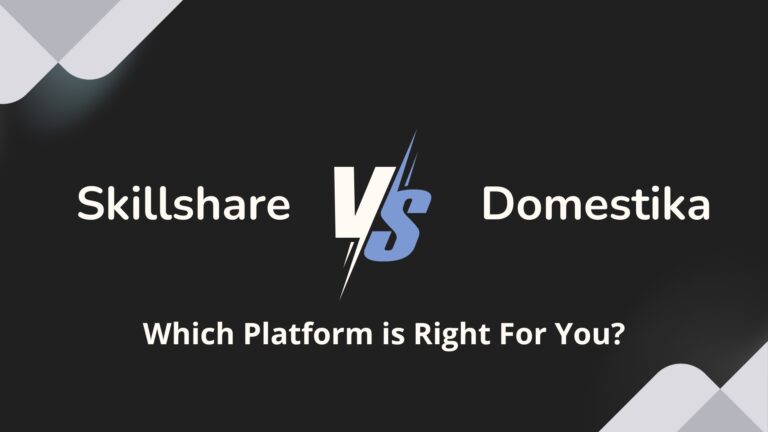11 Differences Between a Startup and a Small Business
If you’re confused about whether you’re running a startup or a small business, you’re not alone!
Today, “small business” and “startup” are often used interchangeably. The confusion is understandable.
Does the difference really matter?
Yes, when you are executing a business idea, you should know what kind of entrepreneur you want to be down the lane: a startup founder or a small business owner.
It helps you define your business goals and set your course for success early on.
Let’s understand the key differences between a startup and a small business and find out what fits you the best.
Startup vs Small Business: The Key Difference
There are numerous differences between a startup and a small business. We’ll first understand the basic difference.
Let’s take an example.
There’s an ABC startup that aims to disrupt analytics with their new product. The founders, along with their team, developed an innovative product or solution that could serve their target audience.
This startup aims for rapid growth and wants to be a dominant player in a short amount of time. They might need funds for research and development to scale their operations or want to quickly gain recognition, positioning themselves for an acquisition.
In the second scenario, a small business owner, say, a designer, wants to focus on creating custom websites for entrepreneurs or businesses. He also plans to offer services such as website maintenance and SEO optimization. The business is profitable, and he is scaling it by hiring a few more employees and expanding his services.
Here, characteristics such as rapid growth, market share, and funding come into the picture when you think about the startup.
On the other hand, a small business’s primary focus would be to stay profitable, maintain quality, and offer personalized experiences to their customers.
| A startup is in search of a scalable business model. They want to find a sustainable model that can help them serve their target customers and drive consistent revenue. A small business doesn’t need to find a scalable model. They have their target audience and revenue model set from day one. |
That’s the broader view…
Let’s now delve into the differences between startups and small businesses based on certain factors.
Here are the factors we compare:
1. Goals
The ultimate goal of a startup is to go bigger from day one. They start with an intent to be acquired or be a dominant player as they scale.
On the other hand, a small business typically wants the business to stay afloat from the beginning. Most of the small businesses would be in a sole proprietorship structure for their lifetime. They typically start with a product or a service and find a market to sell that idea. Things are much more defined compared to a startup.
This is true whether their product is a cupcake, an article of clothing, or an interior design service.
2. Innovation
This is a significant factor that differentiates startups from small businesses.
Technology and innovation lie at the core of startups. They allocate resources to develop and refine their products and services and stay competitive. These resources could be developers, the customer service team or technology.
On the other hand, small businesses do not prioritize innovation. While there could be a chance to innovate products or services to be competitive, they are often similar to other firms. Their focus is to optimize existing offerings to increase revenue and minimize costs.
3. Success rate
Startups have a higher failure rate than small businesses. Almost 90% of startups survive the first year, but 70% of them fail within the next five years. They fail for diverse reasons. The most common ones are misinterpreting product-market fit, poor marketing strategy, and cash flow problems.
Small businesses, on the other hand, tend to have a higher success rate, as they are often operating in established markets and have a proven business model. According to research, around 80% of small businesses survive the first year. By the end of the next year, 70% of them survive, and 50% of the small businesses will survive by the end of the fifth year.
4. Scope of the Business
You might be aware by now that startups often have a broader, global scope, aiming for a wide market reach and scalability. So, they want to make their mark in the industry on a larger scale.
However, small businesses have a local or regional focus, serving a specific community or niche market. In some cases, they are limited to certain audiences and platforms (like Etsy or Amazon). They focus on building a loyal customer base.
5. Exit Strategy
What’s my startup’s exit strategy?
This is one of the top questions a startup founder should ask himself as he sets up his business. A startup can exit by getting acquired by a top MNC and selling a stake to a partner or investor through management and employee buyouts (MBOs) or IPOs (Initial Public Offerings).
The timing and execution of the exit strategy are crucial for maximum returns.
It doesn’t mean all startups need an exit strategy, but most do. In general, a startup can become a typical company or a full-fledged enterprise, too.
Small businesses focus on long-term growth, so they don’t have a specific exit strategy. While exits are not excluded, they are not always a primary goal.
As the business grows, the owners treat their enterprises as their family businesses or another source of income. In this case, the business owner emphasizes building a business that withstands market fluctuations and provides value to the users and potential customers.
6. Investments
Startups typically demand a huge initial capital. Startups usually raise funds by Venture Capitalists (VCs), Crowdfunding, Angel Investors, etc., to launch and scale their business operations. They use the money for innovative ideas, rapid development, and new market entry. These investors not only offer funds but also expertise and guidance. This kind of relationship aims to strengthen the founders’ and the startups’ scalability and success in a competitive landscape.
Small businesses, on the other hand, are typically self-funded or rely on loans from banks or other financial institutions.
7. Risk tolerance
Startups are generally more willing to take risks than small businesses, as they are often trying to disrupt existing markets or create new ones.
Small businesses, on the other hand, tend to be more risk-averse and focus on maintaining a steady stream of revenue.
8. Growth strategy
Startups often pursue aggressive growth strategies to capture market share and establish a competitive presence quickly. They frequently prioritize customer acquisition, even at the expense of short-term profitability.
Let’s say a startup launches a new mobile app. In the initial phase, they may choose to launch the app for free to attract a large customer base, test their product-market fit, and make changes to the current version. Over time, they monetize using their premium features organically or through ads. This strategy accelerates their expansion and valuation growth.
Small businesses typically adopt more conservative and sustainable growth strategies. They focus on building a loyal customer base and maintaining profitability.
A graphic designer who offers services can start a blog or a YouTube channel where he shares his tips and strategies and monetizes them through ad networks or affiliate marketing. As part of his business expansion, he can sell ready-made templates or custom solutions, ensuring stable business growth.
Additional Read:
9. Lifestyle
Startups typically have a dynamic and fast-paced work environment, with the founders and the core team taking on a huge amount of stress. Team members may work long hours to meet tight deadlines and navigate the uncertainties inherent in early-stage ventures. However, it also depends on the startup stage and funding. The pressure in the initial stages is real. Therefore, it contributes to a demanding lifestyle. This kind of startup environment can impact your work-life balance.
Also, a startup founder imbibes significant learning and growth throughout his journey.
In contrast, small business owners experience a better work-life balance with regular and manageable work hours. The steadier pace allows for a more sustainable approach to daily operations. So, the businesses also tend to be more rooted in the long-term stability of the company.
10. Flexibility and Adaptability
By now, you might have understood that startups are often more flexible and adaptable than small businesses. Since the startups are still in the process of figuring out their business model, they would quickly pivot in response to changing market conditions.
Small businesses, on the other hand, tend to be a bit rigid and may have a harder time adapting to change since their business models are already fixed.
11. Profitability
Startups are often focused on growth and market share and may not be profitable for several years.
Small businesses, on the other hand, tend to be more focused on profitability and generating revenue from the outset.
I hope this article helped you get a clear picture of the differences between startups and small businesses. Let me know if you have any thoughts in the comments below. We’d love to know your ideas.






